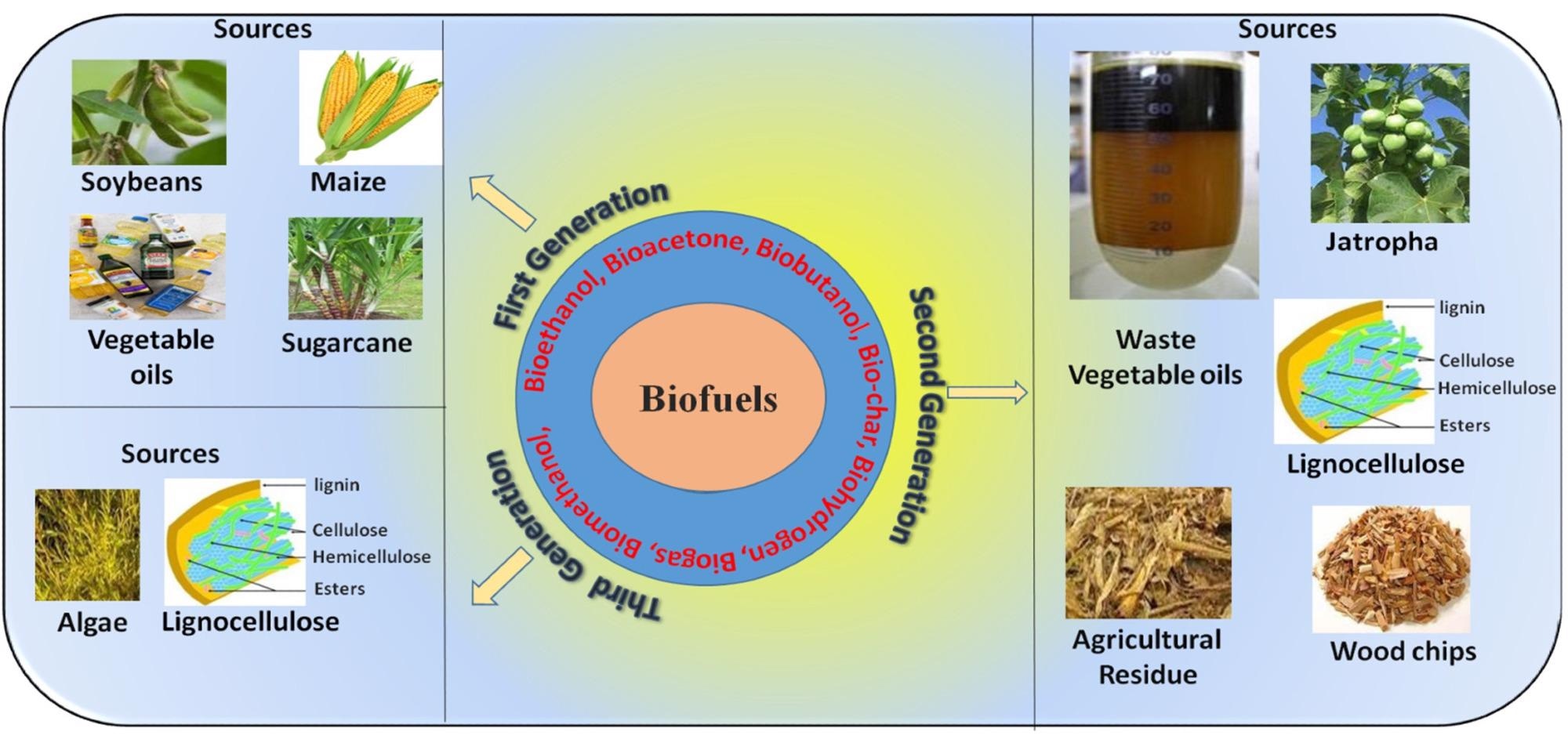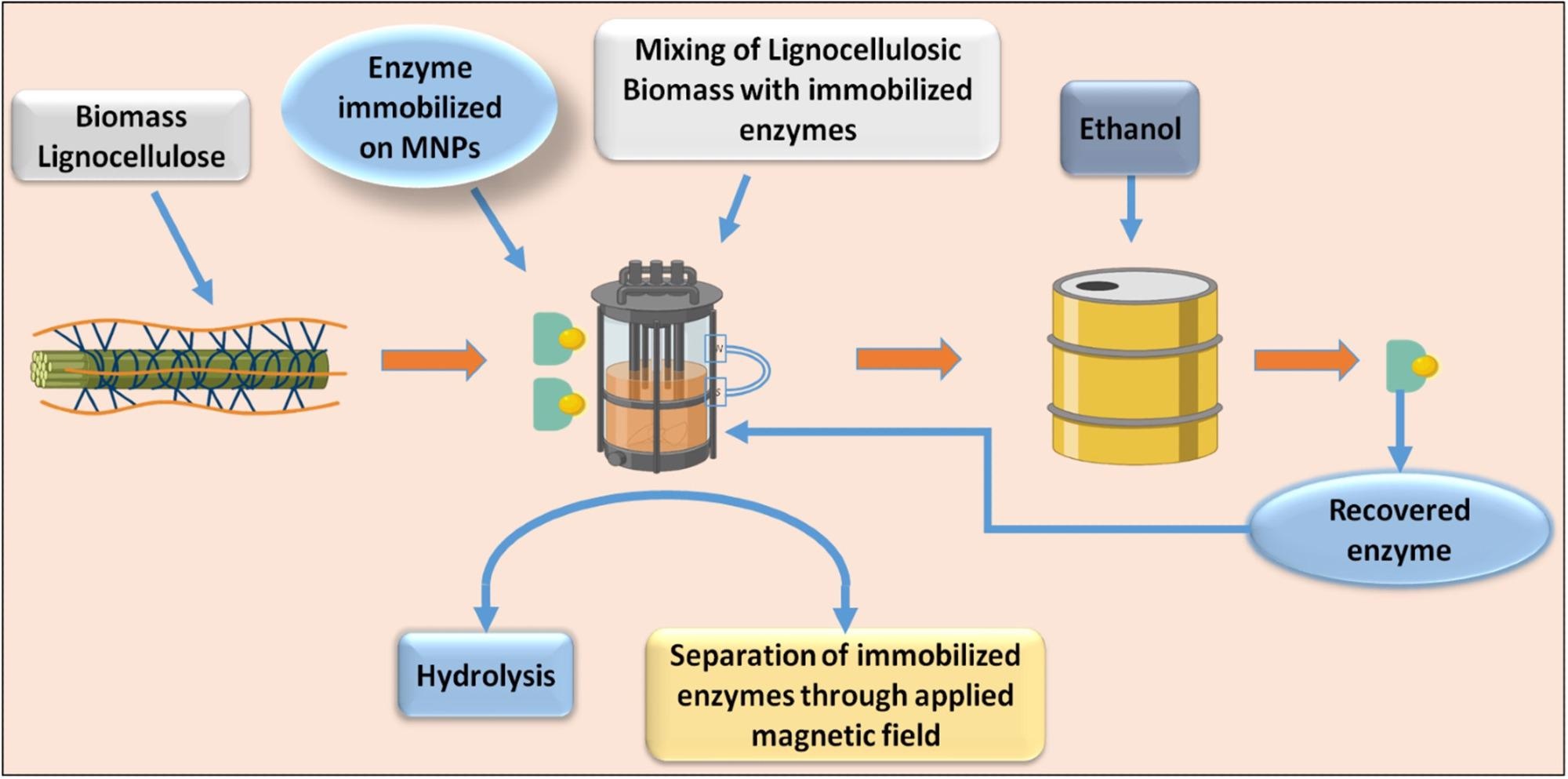The widespread adoption of biofuel represents a promising step in the global shift away from fossil fuel use, which is well known to be a major threat to human health and the environment.
Biofuel is widely regarded as the future of petroleum-based industries, offering a cleaner, renewable, safer, and more environmentally friendly alternative to rapidly dwindling supplies of petroleum-derived fuels.
Biofuels are created from the conversion of biomass—such as vegetables, corn, soybean, sugarcane, palm oil, or the oil extracts of seeds or kernels of non-edible crops—into liquid fuels which can be used directly to meet a myriad range of transportation fuel needs.
A key benefit to employing biofuels in transportation applications is that it reduces CO2 emissions. It is estimated that the use of biodiesel produces around 60% less carbon dioxide than its fossil fuel counterparts.

Representation of biofuels, types of biofuel, different types of generation of production, and their various sources. Image Credit: Arya, I et al., Catalysts
Some of the most significant barriers to the production of biofuels on an industrial scale are related to the limited availability of technical solutions, time-consuming production processes, and higher costs.
Most notably, the processes used to convert feedstock into biofuel products are highly varied depending on the materials used, making these difficult to implement at scale.
A number of studies and projects have highlighted the benefits of nanotechnology and nanomaterials in addressing these barriers to large-scale biofuel production, with a combination of nanotechnology and processes such as pyrolysis, gasification, hydrogenation, and anaerobic digestion offering excellent potential for biofuel production.
The benefits of nanoparticles for biofuel synthesis stem from their size and unique properties; for example, their high surface area to volume ratio and other attributes, including high degrees of stability, crystallinity, catalytic activity, and adsorption capacity.
Using nanotechnology to produce biofuels at a commercial or industrial scale has been historically challenging due to the need for fully-developed nano-catalyst-based biofuel production, which has yet to fully emerge. Instead, many studies are focused on using existing, potentially less efficient, resources to improve biofuel production.

Biofuel production with the use of cellulase incorporated in MNPs (magnetic nanoparticles) to break down cellulose. Image Credit: Arya, I et al., Catalysts
Edible crops have typically been utilized for the large-scale production of biofuels, with fewer instances of biofuel production from non-edible sources. The use of nanotechnology is increasing the amount of biofuel produced from non-edible sources, however.
The most commonly encountered types of nanoparticles used in biofuel solutions were reported to be carbon nanotubes (CNTs), magnetic nanoparticles, acid-functionalized nanoparticles, metallic nanoparticles, and metal-oxide nanoparticles; each of these has a wide range of applications and potential benefits.
For example, nanoparticles’ large surface area and super magnetic properties under an applied field make them easier to separate from a biofuel cell, meaning that vital and often expensive enzymes can be reused and recycled more easily.
The review goes on to summarize and explore the current and potential uses of nanoparticles in a number of biofuel production processes including biohydrogen production, industrial biogas production, bioethanol production, and biodiesel production.
In each of these use cases, it was evident from the review that the inclusion of nanoparticles offered tangible benefits and was able to significantly enhance these production processes.
These enhancements were determined to be primarily due to nanoparticles’ unique physicochemical properties, including their large surface-area-to-volume ratio, high reactivity, good dispersibility, and high specificity.
While the benefits of utilizing nanoparticles and nanotechnologies in biofuel production are clear, a number of barriers do remain to the successful commercialization of this process.
It is imperative the nanoparticles are synthesized and applied in ways that are non-toxic to microorganisms and that these remain sustainable and environmentally friendly in line with the motivation for biofuels’ use to replace fossil fuels.

Preparation of FAME (fatty acid methyl ester) Biodiesel from Triglyceride. Image Credit: Arya, I et al., Catalysts
It will also be important to develop biological nanoparticle synthesis methods in place of chemical methods – a process that necessitates stringent operational conditions and excellent safety and quality control.
The production of biofuels is not without its environmental consequences. For example, biofuel production from edible crops has been reported to aggravate the global food crisis and negatively impact biodiversity due to the amount of land required to grow feedstocks for biofuels.
Nanoparticles’ potential to make biofuel production more efficient and sustainable could be a key driver in addressing these issues, helping transform biofuel into a truly sustainable, green alternative to fossil fuels.
Disclaimer: The views expressed here are those of the author expressed in their private capacity and do not necessarily represent the views of AZoM.com Limited T/A AZoNetwork the owner and operator of this website. This disclaimer forms part of the Terms and conditions of use of this website.